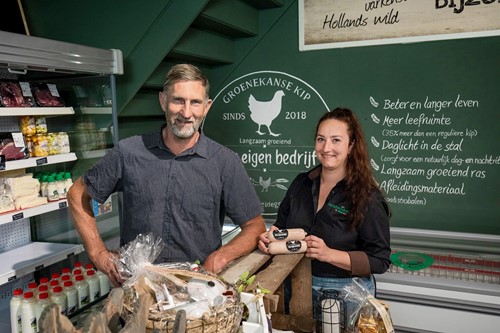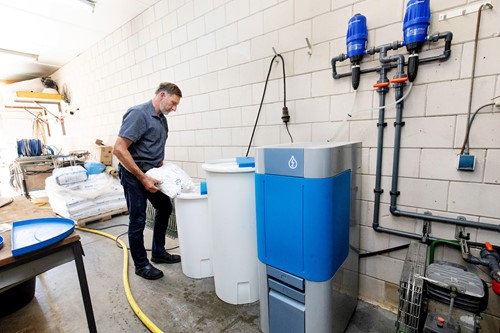
Van Maanen focuses on further optimization
This article appeared on 8 September 2020 on Boerderij.nl
There are actually two companies on the property of the Van Maanen family: the broiler company and a Landwinkel. Where parents Wijnand and Ingrid changed course and switched from sows and rearing hens to broilers, daughter Willemieke is steadily building the shop. In addition to family ties, the common denominator is entrepreneurship.
On an early Thursday morning, it is still quiet in the yard of broiler farm Van Maanen, located in the Utrecht village of Groenekan, under the smoke of the city of Utrecht. But that has often been different in recent months, says Willemieke van Maanen. “Sometimes there is a row of 20 meters here”, she gestures to the separated part of the yard in front of one of the broiler houses that serves as a parking area for the hundreds of visitors a week. Willemieke van Maanen runs a Landwinkel at the farm of her parents Wijnand and Ingrid van Maanen, in what used to be an old machine shed in front of the stable: Landwinkel de Groenekan.
The corona epidemic has given sales an extra boost. “Sometimes people stood in line for an hour,” she says, with some surprise. “You notice that people want a local product. Half also ask what exactly our own product is, because they want to take it with them."

Wijnand (58) and Willemieke (28) van Maanen. Wijnand and his wife Ingrid van Maanen have a broiler farm with 72,000 broilers (divided over three houses) according to the New Standard Chicken concept. Daughter Willemieke runs a Landwinkel on the farm, in the front area of one of the broiler houses. Landwinkel is a cooperative of 95 farmers, who sell local farm products throughout the country. Each round, some of the meat from the company's own chicks comes back from the slaughterhouse, is packaged at the company's own farm and sold from there.
Actually, there are two companies in the yard. The two branches, Landwinkel and broiler farm, are fairly strictly separate branches. Where Wijnand and Ingrid's broiler farm is, is Willemieke's Landwinkel. At the same time, Willemieke is helping out at the company now that her parents have just taken a break. And vice versa, the broiler business is important to the Landwinkel. “It does reinforce each other,” notes Wijnand van Maanen. There is a viewing window in the Landwinkel, through which interested customers can see how broilers are kept. "Some people come in and say: 'First see if my chicks have grown' says Willemieke. People also come for the experience.”
Sale of own chicken
In the shop, she sells hundreds of products from farms all over the Netherlands. An important part of the range: a freezer full of their own chicken products. On the farm, Wijnand and Ingrid van Maanen keep 72,000 broilers according to the New Standard Chicken concept. The poultry farm has not gone without a hitch. Six years ago they kept sows and raised pullets. In 2014, however, the egg market collapsed and with it rearing. “We had seven months of a vacancy in 2014”, Wijnand recalls. "That doesn't help you."
Renovate rearing stables
When Storteboom and de Heus asked whether they wanted to set up slow-growing broilers, they decided to do so. At first temporarily, but it soon became definitive. First, they rebuilt the rearing houses - removed the grids and newly installed manure belts - and then also the sow barn. Not typical broiler houses in terms of dimensions (where the walls of the former rearing houses are 3 meters high, the old sow shed is 32 meters wide), but this has never caused any problems in terms of climate.
Financially, "a legacy" of the bad years still remains.
“We are therefore committed to optimizing”, says Wijnand. While they performed well with chicks in the first year, a dip followed. During the research, bacteria counts in the drinking water turned out to be extremely high. One of the things he has, therefore, done is to purchase a water disinfection machine from Watter. Not a small investment, but one that he is very satisfied with. While he used to sometimes suffer from clogged nipples, this has not happened once after eight weeks of using the machine.
Marek infection
Van Maanen: “I now have crystal clear water. We took samples six months ago: the water is completely germ-free.” In addition, in retrospect, they struggled for a year with a Marek infection on the farm. Because Marek is rare in broilers, and they are also in a very poor poultry area, it took a long time for the cause of the problems to emerge. In the last weeks of the round, the chicks did not want to grow well. Van Maanen now has the chicks vaccinated for Marek as standard. He also switched feed: to a complete feed from De Heus in which wheat is mixed as standard. All in all, optimization in various areas has had an effect in the last rounds in terms of results. Moreover, the annual antibiotic report came in just last week: he did not have to use antibiotics for the entire previous year.
It is a completely different sport
All in all, he is happy with the switch to broilers, although it took some getting used to at first. Van Maanen: “It is a completely different sport. When rearing, for example, you have time for recovery with a vaccination reaction. Here every day counts, that's where you get your profit. If a hen is healthy in rearing, but a bit lighter, that is no problem. If you miss a few days now, you won't catch up. Everything has to be right.”

Wijnand van Maanen fills the water disinfection machine with salt tablets, which are converted into a 'nontox' agent that reacts with pollution.
Little promotion
That eye for detail is also reflected in the store at the company. Little can be seen of the fact that this was once a machine shed. Modern dark green peeled walls, white cabinets, robust wooden shelves and accessories; everything furnished and arranged with an eye for detail. Most customers now find their way to the store by themselves, Willemieke says, she does little promotion. What she does a lot: explain to people exactly what they do on the farm. With a location in De Bilt, they are located in an urban region. “People often have prejudices about poultry farming,” says Willemieke. Wijnand also noticed last year, when they participated in the national open days organized by the Kip.Kiplekker foundation, that he sometimes had to talk like Brugman, because people had a certain image in their head. “Sometimes it seems like mopping with the tap open, telling your story,” says Willemieke. “But at the same time, there are also many interested people. Every product in our store has a story. And others also tell our story. Our chicken products are in dozens of other (Land) shops and restaurants.”
Author: Kirsten Graumans
Photos: Herbert Wiggerman



